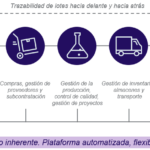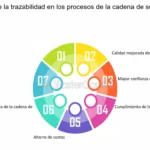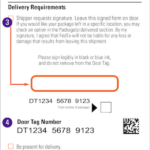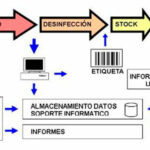
Trazabilidad: The Key to Efficient Supply Chain Management
🔍
What is Trazabilidad?
Trazabilidad, also known as traceability, refers to the ability to track and trace the movement of products and materials throughout the supply chain. It involves capturing and recording information about the origin, location, and status of goods at every stage.
The Importance of Trazabilidad
Trazabilidad plays a crucial role in supply chain management as it provides visibility and transparency. By having real-time information about the location and condition of products, companies can make informed decisions, minimize risks, and improve overall efficiency.
Enhancing Logistics and Inventory Management
With the use of advanced technologies such as barcodes, RFID tags, and blockchain, trazabilidad enables companies to automate various processes and streamline their logistics and inventory management. This results in reduced costs, optimized resource allocation, and better customer service.
Trazabilidad and Quality Control
Trazabilidad is particularly essential in industries where product quality and safety are critical, such as the food and pharmaceutical sectors. By implementing robust traceability systems, companies can quickly trace and recall products if quality issues arise, improving consumer trust and brand reputation.
The Future of Trazabilidad
As supply chains become more complex and global, the importance of trazabilidad will continue to grow. Emerging technologies such as IoT sensors, artificial intelligence, and blockchain will further enhance traceability capabilities, enabling companies to achieve greater efficiency, sustainability, and responsiveness in their supply chain operations.
The Importance of Traceability in Food Safety
🍽️
Traceability plays a crucial role in ensuring food safety throughout the entire supply chain. In an age where consumers are becoming increasingly concerned about the origin and quality of their food, traceability provides transparency and accountability. By implementing effective traceability systems, producers, manufacturers, and retailers can identify and address potential risks, prevent contamination, and quickly respond to food safety incidents.
One of the main benefits of traceability is its ability to track and trace the movement of food products from farm to fork. This means that if an issue arises, such as a foodborne illness outbreak or a product recall, authorities can quickly identify the source and take appropriate action. Traceability also enables companies to proactively address food safety concerns by identifying weak points in the supply chain and implementing preventive measures.
In addition to protecting public health, traceability also offers several business advantages. It enhances consumer trust and confidence, as customers feel reassured knowing that the food they are consuming has been carefully monitored and is safe for consumption. Furthermore, traceability can help companies improve their operational efficiency by streamlining processes, reducing waste, and minimizing the economic impact of recalls.
Overall, traceability is a fundamental component of ensuring food safety. It not only protects consumers from potential risks but also benefits companies by fostering trust, improving efficiency, and mitigating financial losses. As consumers continue to prioritize safety and quality in their food choices, the importance of traceability in food safety cannot be overstated. 🛡️
- 🌳🔍 Descubre la importancia de la www trazabilidad forestal en nuestra sociedad
- 🔍💡 Todo lo que necesitas saber sobre la 🔎trazabilidad COVID: ¿Cómo funciona y por qué es importante?
- 🔍✨ Descubre la importancia de la trazabilidad de las muestras: ¡Asegura la calidad en tu laboratorio!
- 🐮✅ La importancia de la trazabilidad ganadería: ¿Cóm
- 🔎📦 Trazabilidad Obligatoria: Todo lo que necesitas saber para cumplir con los requisitos 📋🔍
Enhancing Product Quality with Traceability Systems
🔍
Traceability systems play a crucial role in enhancing the quality of products in various industries. These systems allow businesses to effectively track and manage their products throughout the entire supply chain process. By implementing traceability systems, companies can ensure that their products meet the highest standards of quality and safety.
One of the key advantages of traceability systems is the ability to identify and address product defects or issues quickly. With the help of advanced technology, businesses can track each product’s journey from production to distribution. This enables them to pinpoint any potential problems and take immediate action to rectify them, thereby improving the overall quality of their products.
Furthermore, traceability systems also provide valuable insights into the origin and composition of products. By utilizing unique identifiers, such as barcodes or RFID tags, companies can gather detailed information about the raw materials, manufacturing processes, and handling procedures involved in the production of each item. This level of transparency not only ensures product quality but also helps build trust with consumers.
In addition, traceability systems are particularly beneficial for industries that deal with perishable or sensitive products, such as the food and pharmaceutical sectors. These systems enable businesses to accurately monitor temperature, humidity, and other environmental factors that can affect product quality. Consequently, companies can take proactive measures to maintain optimal conditions and prevent any potential spoilage, contamination, or degradation of their products.
Ultimately, the implementation of traceability systems is a win-win situation for both businesses and consumers. Companies can enhance the quality of their products, reduce costs associated with recalls or product failure, and gain a competitive edge in the market. On the other hand, consumers can have confidence in the products they purchase, knowing that their quality is assured through a robust traceability system.
With traceability systems becoming increasingly prominent in today’s global marketplace, businesses must prioritize their implementation to effectively enhance product quality. By investing in this technology, companies can ensure that their products meet the highest standards and meet the ever-growing expectations of consumers. 💪🌐
Boosting Supply Chain Efficiency with Traceability Technology
🚚
Efficiency is a key factor in any supply chain management system. The ability to track and trace products throughout each stage of the supply chain is crucial for ensuring smooth operations. This is where traceability technology comes in. With the help of modern tracking solutions, businesses can optimize their supply chain processes and enhance overall efficiency.
Traceability technology enables businesses to have real-time visibility into their supply chain operations. By using barcode systems, RFID tags, or GPS tracking, companies can accurately track the movement of goods from the point of origin to the final destination. This not only helps in identifying bottlenecks and inefficiencies but also enables proactive decision-making to avoid potential disruptions.
One of the key benefits of traceability technology is improved inventory management. With real-time data on hand, businesses can have better control over their stock levels. This means they can minimize wastage, prevent stockouts, and optimize the distribution of goods. By having accurate inventory information, companies can improve their forecasting capabilities and make informed purchasing decisions.
Traceability technology also plays a crucial role in ensuring product quality and safety. By implementing unique identifiers and digital logs, businesses can easily trace the sources of raw materials and ingredients used in their products. This helps in identifying potential quality issues and enables swift product recalls if needed. Consumers also benefit from this transparency, as they can have more confidence in the safety and authenticity of the products they purchase.
Moreover, traceability technology can also help in optimizing transportation and delivery processes. By utilizing GPS tracking and routing algorithms, businesses can efficiently plan their delivery routes, reduce transportation costs, and minimize delivery delays. This not only improves customer satisfaction but also reduces the carbon footprint by minimizing fuel consumption and optimizing vehicle allocation.
In conclusion, traceability technology is a game-changer for boosting supply chain efficiency. By harnessing the power of real-time tracking and data analytics, businesses can optimize their inventory management, ensure product quality and safety, and streamline transportation processes. The benefits of implementing traceability technology are clear: enhanced efficiency, improved customer satisfaction, and a competitive advantage in a fast-paced business environment.
Traceability Regulations: Compliance and Beyond
🔍
Traceability regulations play a crucial role in ensuring compliance in various industries. From food safety to pharmaceuticals, traceability helps track and monitor products throughout the supply chain. But compliance with these regulations goes beyond mere adherence – it also brings immense value and benefits to businesses.
One of the main reasons why traceability regulations are essential is that they help prevent and manage product recalls. By implementing a robust traceability system, companies can quickly identify the root cause of an issue and limit the impact on consumers. This transparency builds trust and demonstrates a commitment to consumer safety.
Moreover, traceability also allows businesses to improve their supply chain efficiency. By accurately tracking and recording product movement, companies can optimize their inventory management, reduce waste, and minimize the risk of counterfeit or fraudulent products entering the market. This not only helps companies save costs but also enhances their overall operational performance.
Furthermore, compliance with traceability regulations can open doors to new markets and partnerships. Many countries and organizations require suppliers and manufacturers to meet specific traceability standards. By demonstrating compliance, businesses can prove their commitment to quality and safety, making them more attractive to potential clients and collaborators.
In addition, traceability regulations provide opportunities for businesses to enhance their brand reputation. In today’s digitally connected world, consumers are more conscious of where their products come from and how they are made. By implementing traceability systems and documenting their commitment to compliance, companies can showcase their transparency and ethical practices, ultimately gaining the trust and loyalty of customers.
Overall, traceability regulations, compliance, and beyond are pivotal for businesses across industries. From preventing product recalls to improving supply chain efficiency and enhancing brand reputation, companies that embrace traceability can reap significant benefits. This not only ensures regulatory compliance but also sets them apart in today’s competitive marketplace.
 🛠️⚠️ Descubre las desventajas de la trazabilidad interna o de procesos y cómo evitarlas
🛠️⚠️ Descubre las desventajas de la trazabilidad interna o de procesos y cómo evitarlas 🔎🌍 Trazabilidad Nacional: La clave para un seguimiento completo y eficiente en todo el país
🔎🌍 Trazabilidad Nacional: La clave para un seguimiento completo y eficiente en todo el país 🔎💡 Descubre cómo optimizar la trazabilidad organizacional con el SENA
🔎💡 Descubre cómo optimizar la trazabilidad organizacional con el SENA 🔍 Descubre la importancia de la trazabilidad RNPQ en la industria 🧪
🔍 Descubre la importancia de la trazabilidad RNPQ en la industria 🧪 🚚💡 Todo lo que necesitas saber sobre la trazabilidad FedEx: seguimiento de paquetes y más
🚚💡 Todo lo que necesitas saber sobre la trazabilidad FedEx: seguimiento de paquetes y más 🔎✅ Descubre la importancia de la trazabilidad en el comercio justo
🔎✅ Descubre la importancia de la trazabilidad en el comercio justo 🔍👨🔬 ¡Descubre la importancia de la ⚙️ trazabilidad UCT en la industria!
🔍👨🔬 ¡Descubre la importancia de la ⚙️ trazabilidad UCT en la industria! 🔍✅ ¡Descubre la trazabilidad del Covid 2022! Todo lo que necesitas saber 🦠📆
🔍✅ ¡Descubre la trazabilidad del Covid 2022! Todo lo que necesitas saber 🦠📆 🔎🧪 Descarga el PDF de Trazabilidad en Esterilización: ¡Asegura la Seguridad en tu Proceso!
🔎🧪 Descarga el PDF de Trazabilidad en Esterilización: ¡Asegura la Seguridad en tu Proceso!